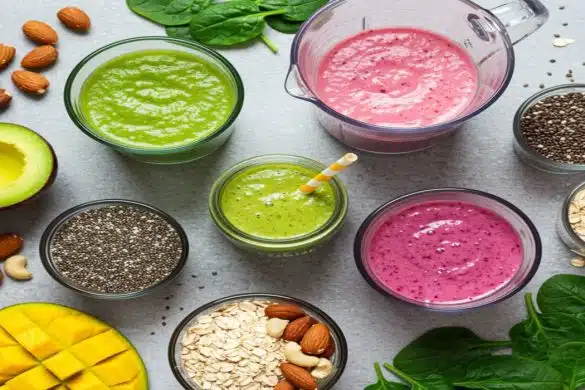It can be challenging to maintain a healthy diet in the winter months. The cold weather makes us crave comfort foods that are often high in fat and calories. But with the proper knowledge and strategies, you can stick to your health goals throughout the season. This article provides an easy-to-follow guide for eating healthy during winter: what to eat and what not to eat.
The first step is understanding why our diets change in the wintertime. In addition to seasonal cravings, fewer fresh fruits and vegetables are available due to colder temperatures. As a result, we may find ourselves reaching for processed snacks or unhealthy meals instead of nutritious options.
Fortunately, there are plenty of ways to incorporate nutrient-dense ingredients into your diet, even during these chillier months. With this Definitive Guide To Eating Healthy During Winter, you will learn how to identify healthy choices while avoiding those that could potentially sabotage your progress toward better health! So read on and discover everything you need to know about eating well this winter.
Why Eating Healthily In Winter Is Crucial
The winter months can be difficult for people to maintain healthy eating habits. According to the National Institutes of Health, up to 25 per cent of Americans are at risk of becoming overweight or obese during the colder season. With this in mind, we must understand what foods should and shouldn’t be consumed during these months to stay on track with our nutrition goals.
When temperatures start dropping and days become shorter, our diets often turn for the worse; comfort food cravings tend to increase, as do feelings of fatigue and sluggishness. However, plan and make mindful decisions about which foods you consume. You’ll find yourself staying fuller longer while also avoiding unhealthy snacking habits. To start on the right foot, focus on nutrient-rich whole grains such as quinoa and brown rice, and plenty of leafy greens like kale and spinach. Additionally, incorporate lean proteins into meals like fish or chicken breast and plant-based protein sources like lentils and beans. These items provide vital vitamins and minerals that help keep us energized throughout the day.
It’s just as essential to avoid certain types of food, too - processed snacks high in sugar or unhealthy fats are best left out of your meal plan entirely. Instead, opt for natural sugars found in fruits such as apples or bananas, combined with some dairy products like yogurt or cheese for a snack full of calcium, B vitamins, and other beneficial nutrients. Eating healthily through the winter doesn’t have to be complicated – sticking to wholesome ingredients will give your body everything it needs without sacrificing flavor!
Nutritious Foods To Include In Your Meals
Now that we know what to avoid let’s look at some of the best nutritious foods to include in our winter meals. Incorporating these items into your diet will ensure you get all of the essential vitamins and minerals needed for a balanced diet during colder months.
Start with hearty grains like barley or farro, packed full of fiber and protein; they can be cooked up as sides, added to soups or salads, or eaten on their own. If you’re looking for something more substantial, try incorporating root vegetables such as carrots and parsnips into dishes – these offer nutrients like Vitamin A and potassium, which help support healthy cell growth and repair. And don’t forget about legumes! Beans, lentils, chickpeas, split peas, and other pulses provide an excellent source of plant-based proteins while also being low in calories and fat.
Finally, make sure to add healthy fats into your meals, too – think olive oil, nuts, avocados, nut butter, and seeds (like chia), which all contain monounsaturated fatty acids that have been linked to reducing inflammation throughout the body. These options should form the basis of any winter meal plan – when combined with fresh produce they create a variety of delicious recipes that energize us during this time of year!
Unhealthy Foods To Avoid During The Colder Months
While it is essential to focus on the nutritious foods we should eat during winter, it’s equally as vital to understanding which unhealthy items are best avoided. When temperatures drop, many of us tend to reach for comfort food or sugary snacks. Still, these things can leave us feeling sluggish and deprived of essential vitamins and minerals.
Some common culprits include fried fast food, processed meats like sausages and hotdogs, deep-fried snacks such as chips and potato wedges, sweetened cereal, white bread and pastries, energy drinks, and candy bars – all of which contain high levels of saturated fat or added sugars. These foods not only provide little in terms of nutritional value, but they also take up valuable space in our diets that could otherwise be filled with healthier options.
It’s no secret that eating a balanced diet is vital to maintaining good health throughout winter, so if you want to stay energized while avoiding potential risks associated with unhealthy choices, then make sure to limit your intake of these ‘sometimes’ foods.
Seasonal Vegetables And Fruits That Provide Maximum Nutrition
Stocking up on seasonal fruits and vegetables is a great place to start for anyone looking to get the most out of their winter diet. While it can be tempting to choose pre-packaged items or takeaways due to convenience, opting for nature’s bounty has its own benefits.
Root veggies like potatoes, turnips, and sweet potatoes are packed with essential vitamins and minerals that help energize us throughout the colder months. At the same time, cruciferous vegetables such as cauliflower, cabbage, and Brussels sprouts provide an array of antioxidants that support our body’s immune system. Fruits such as apples, oranges, and pears burst with fiber and Vitamin C – essential nutrients keeping us healthy during winter.
Eating seasonally also helps ensure maximum freshness when shopping for produce; this approach ensures we get the best value from our grocery budget. So why not use Mother Nature’s gifts by adding more delicious seasonal fruits and veggies to your meals? You’ll feel satisfied knowing you’ve made wise choices toward nourishing yourself through the coldest part of the year!
Healthy Cooking Tips For Making Tasty Winter Dishes
Now that you’ve stocked up on seasonal fruits and veggies, it’s time to turn them into tasty winter dishes! Here are some helpful tips when cooking during this season:
First of all, consider the temperatures outside. When it’s chilly out, we tend to crave warm food – so why not take advantage of this by making roasted vegetables or hearty soups? Both options are simple to make and provide abundant flavor and satisfaction. Plus, they can be easily tailored to your individual taste preferences.
Another great way to enjoy healthy meals in winter is by using spices. Spices such as turmeric, cinnamon, cumin, and ginger have anti-inflammatory properties which help boost immunity; while adding a kick of flavor too! So remember to sprinkle some spice into your meals for extra nutrition and deliciousness.
Whether preparing something light or warming up with comfort food, these tips ensure you create nutritious meals daily. With just a little effort, eating healthy throughout winter can be as enjoyable as ever!
Natural Ways To Boost Immunity During The Winter Season
As the winter season approaches, we must strengthen our immune systems to prevent potential illnesses. Luckily, there are plenty of natural ways we can do this! Here are some tips for keeping your body healthy and protected during colder weather:
Firstly, focus on getting enough sleep. Aiming for 7-8 hours a night will help ensure that our bodies have time to rest and recharge to fight off infection more efficiently. Eating well is also another great way to boost immunity; consuming plenty of nutrient-rich foods such as fruits, veggies, whole grains, and lean proteins. Additionally, drinking lots of fluids throughout the day is critical – water helps flush out toxins from the body and keeps us hydrated.
It’s also worth considering taking supplements or herbs like garlic, Echinacea, or probiotics which may support your immune system. Of course, if you ever feel unwell, don’t hesitate to contact your doctor immediately – just in case.
By following these simple steps, we can give ourselves an extra layer of protection against colds and flu this winter!
Frequently Asked Questions
What Are The Benefits Of Eating Healthy During Winter?
Wintertime can be a difficult time to stay healthy. With the additional stress of holiday shopping and family gatherings, it is easy to let nutrition take a backseat. But eating healthy during winter has its advantages; not only does proper nutrition help keep you energized throughout the season, but many other benefits come with making smart food choices.
To illustrate this point: one study conducted by Harvard University found that those who ate nutritious foods in the winter were more likely to maintain their current weight or even lose a few extra pounds than those who indulged in unhealthy snacks. This data shows us how important it is to make quality dietary decisions year-round – especially in colder months when our bodies need all the nutrients they can get!
Not surprisingly, research suggests that consuming nutrient-dense meals strengthens immunity while providing essential vitamins and minerals for optimal health. Eating a diet rich in fruits and vegetables gives your body various antioxidants that protect against chronic illnesses like heart disease and cancer. Additionally, fiber helps improve digestion and regularity while promoting satiety – meaning we tend to feel fuller longer after meals with fiber content. So if you want to ward off sickness or add energy on cold days, consider increasing your wholesome whole grains, legumes, nuts, and seeds!
What Are Some Easy And Affordable Meals For Winter?
Eating healthy during winter doesn’t have to be a challenge. Plenty of accessible and affordable meals can help you stay on track with your wellness goals. From soups to stir-fries, there’s something for everyone!
Soups can be an ideal winter meal because they’re packed full of vitamins and minerals from the vegetables used in them. They also require minimal effort but provide enough sustenance to keep one going throughout the day. All it takes is some broth, veggies, and maybe a few spices or herbs – voila! You’ve got yourself a delicious bowl of soup that’ll warm you up quickly. Additionally, if you’d like more protein in your soup, add some diced chicken breast or lean proteins such as lentils or tofu.
Stir-fries are another excellent option for an easy and nutritious meal during the colder months. All you need is some fresh vegetables (or frozen if that’s what’s available) along with a grain such as quinoa, rice, or couscous and any protein you prefer (fish, tofu, etc.). Once everything has been prepped and cooked in a skillet with seasonings, dinner will be ready before you know it! Plus, it tastes even better when leftovers are reheated the next day. Feel free to double up on ingredients when making this dish.
Whether you cook some homemade soup or whip up a quick stir-fry for dinner tonight, eating healthy during winter does not have to break the bank or take too much time out of your busy schedule. With these simple and budget-friendly recipes, nourishing meals while staying within your wellness goals become much more accessible!
Are There Any Supplements I Should Be Taking During Winter?
The question of whether or not supplements should be taken during winter is an interesting one that deserves further investigation. It’s been suggested by some experts that supplementing your diet with vitamins and minerals can help to ensure you’re getting all the nutrients your body needs, especially in colder months when fresh produce may be more limited. But are these claims valid?
Research has shown certain benefits to taking a daily multivitamin, such as improved immunity, better energy levels, cognitive functioning, and reduced risk of developing cardiovascular disease. However, it’s important to note that these results were seen primarily in people with poor diets before supplementation. Therefore, if you already eat a balanced diet rich in fruits and vegetables, then taking additional supplements may not benefit you.
Ultimately, whether or not to take supplemental vitamins and minerals comes down to personal preference. If you feel like your current dietary intake isn’t enough for optimal health – or if you feel sluggish through the winter season – adding a vitamin supplement could be beneficial. But remember that dietary supplements cannot replace healthy eating habits; instead, they should serve only to complement them.
What Is The Best Way To Incorporate Seasonal Vegetables And Fruits Into My Diet?
Eating seasonal vegetables and fruits is a great way to stay healthy during winter. By incorporating them into your diet, you can get the necessary vitamins and minerals for optimal health. Not only do these foods provide vital nutrients, but they also add variety to meals, making it easier to maintain a balanced diet throughout the season.
When looking for what’s in season in winter months, focus on root vegetables like potatoes, sweet potatoes, and carrots; cruciferous veggies such as cauliflower or broccoli; leafy greens like kale or spinach; squash varieties like pumpkin or acorn; mushrooms of all types; apples; pomegranates; oranges and lemons. These nutrient-rich ingredients can make soups, stews, casseroles, stir-fries, or salads – adding flavor and nutrition to any mealtime! Additionally, suppose fresh produce isn’t available in your area. In that case, frozen options can also work while providing essential vitamins and minerals.
So no matter what type of food you prefer – cooked dishes or raw snacks – there are plenty of ways to incorporate seasonal vegetables and fruit into your diet this winter. Doing so will ensure you get enough nutrients without sacrificing taste or satisfaction at mealtimes.
Are There Any Natural Remedies For Boosting Immunity In Winter?
Winter can be a challenging time to stay healthy. With the chill in the air, it’s easy to get sick and feel run down – but there are ways to boost your immunity naturally! Are there any natural remedies for boosting immunity in winter? Some include herbs and spices like ginger, garlic, turmeric, cinnamon, and cardamom.
These nourishing ingredients contain potent antioxidants that can help fight off colds and flu before they even start. Incorporating these into dishes is easy to add flavor and get critical vitamins and minerals. Add freshly grated ginger or garlic to soups or stir-fries, or sprinkle dried seasonings onto roasted vegetables or salads. Eating fruit is another excellent way to give your body essential nutrients during this time of year; citrus fruits like oranges are packed with vitamin C, which helps keep you strong against infection.
Finding creative ways to use seasonal produce is an excellent way to ensure you eat healthily throughout the winter months. Many options are available at farmer’s markets, such as apples, squash, and root vegetables like turnips and sweet potatoes – all of which can be made into delicious meals full of nutritional benefits! And by incorporating natural remedies like herbs and spices, fresh fruits and veggies, you’ll be giving yourself the best chance of staying healthy when temperatures drop.
Conclusion
Eating healthy during winter is a great way to stay energized and keep your body feeling its best. With the right mix of seasonal vegetables, fruits, and easy meals that fit any budget, you can ensure you’re getting all the nutrients your body needs while still enjoying delicious food. Supplements such as Vitamin C and zinc can also help boost immunity, so you don’t get sick during this cold season. Natural remedies like elderberry syrup are also beneficial for keeping winter ailments at bay.
To sum it up, eating well in winter is essential to taking care of yourself. Think of it as a puzzle: each piece helps build on the next until you have completed the whole picture – which would be vibrant health! Like fitting together pieces of a jigsaw puzzle, assembling your daily diet with nutritious foods will provide numerous benefits throughout the colder months.
So take charge of your well-being by making intelligent choices regarding what you eat during wintertime! You’ll soon discover how simple and enjoyable it can be to create meals that nourish both body and soul.















1 comment
awsome article regarding the winter food..